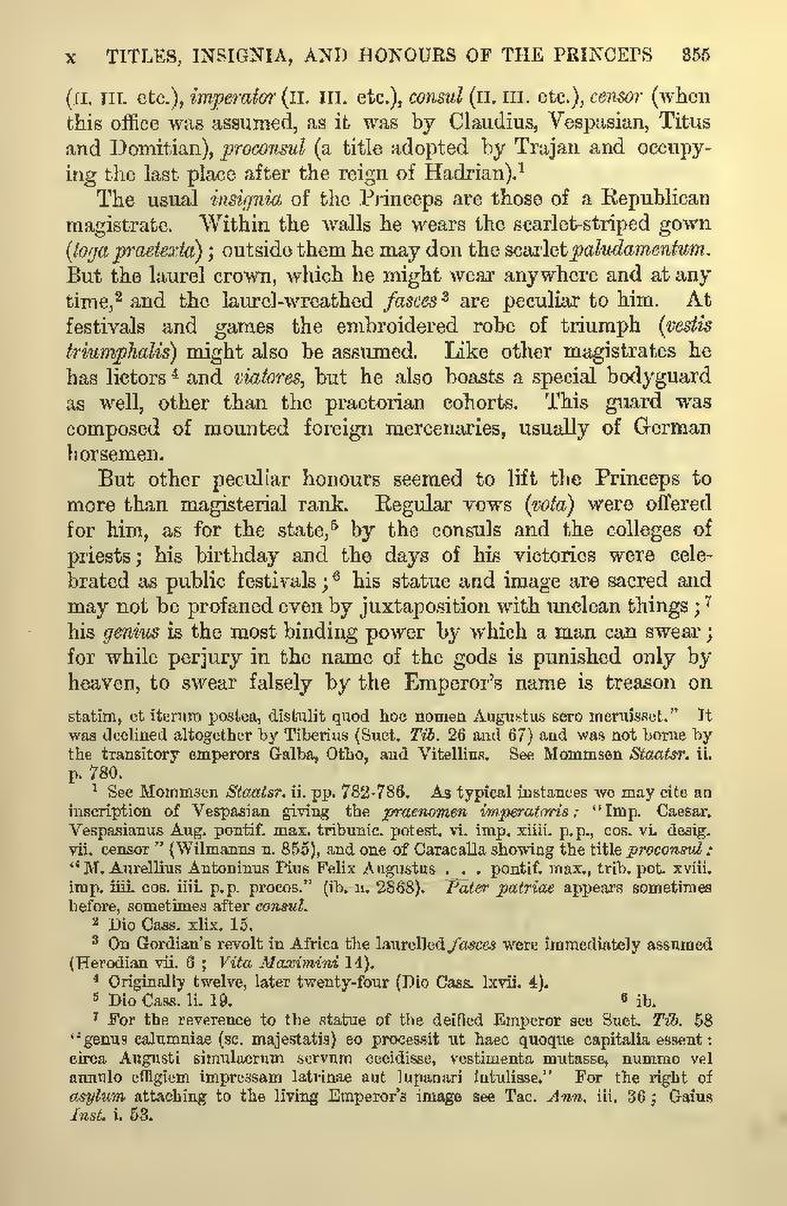(II. III. etc.), imperator (II. III. etc.), consul (II. III. etc.), censor (when this office was assumed, as it was by Claudius, Vespasian, Titus and Domitian), proconsul (a title adopted by Trajan and occupying the last place after the reign of Hadrian).[1]
The usual insignia of the Princeps are those of a Republican magistrate. Within the walls he wears the scarlet-striped gown (toga praetexta); outside them he may don the scarlet paludamentum. But the laurel crown, which he might wear anywhere and at any time,[2] and the laurel-wreathed fasces[3] are peculiar to him. At festivals and games the embroidered robe of triumph (vestis triumphalis) might also be assumed. Like other magistrates he has lictors[4] and viatores, but he also boasts a special bodyguard as well, other than the praetorian cohorts. This guard was composed of mounted foreign mercenaries, usually of German horsemen.
But other peculiar honours seemed to lift the Princeps to more than magisterial rank. Regular vows (vota) were offered for him, as for the state,[5] by the consuls and the colleges of priests; his birthday and the days of his victories were celebrated as public festivals;[6] his statue and image are sacred and may not be profaned even by juxtaposition with unclean things;[7] his genius is the most binding power by which a man can swear; for while perjury in the name of the gods is punished only by heaven, to swear falsely by the Emperor's name is treason on
- [Footnote: statim, et iterum postea, distulit quod hoc nomen Augustus sero meruisset." It
was declined altogether by Tiberius (Suet. Tib. 26 and 67) and was not borne by the transitory emperors Galba, Otho, and Vitellius. See Mommsen Staatsr. ii. p. 780.]
- ↑ See Mommsen Staatsr. ii. pp. 782-786. As typical instances we may cite an inscription of Vespasian giving the praenomen imperatoris: "Imp. Caesar. Vespasianus Aug. pontif. max. tribunic. potest, vi. imp. xiiii. p.p., cos. vi. desig. vii. censor" (Wilmanns n. 855), and one of Caracalla showing the title proconsul: "M. Aurellius Antoninus Pius Felix Augustus . . . pontif. max., trib. pot. xviii. imp. iiii. cos. iiii. p.p. procos." (ib. n. 2868). Pater patriae appears sometimes before, sometimes after consul.
- ↑ Dio Cass. xlix. 15.
- ↑ On Gordian's revolt in Africa the laurelled fasces were immediately assumed (Herodian vii. 6; Vita Maximini 14).
- ↑ Originally twelve, later twenty-four (Dio Cass. lxvii. 4).
- ↑ Dio Cass. li. 19.
- ↑ ib.
- ↑ For the reverence to the statue of the deified Emperor see Suet. Tib. 58 "genus calumniae (sc. majestatis) eo processit ut haec quoque capitalia essent: circa Augusti simulacrum servum cecidisse, vestimenta mutasse, nummo vel annulo effigiem impressam latrinae aut lupanari intulisse." For the right of asylum attaching to the living Emperor's image see Tac. Ann. iii. 36; Gaius Inst. i. 53.
